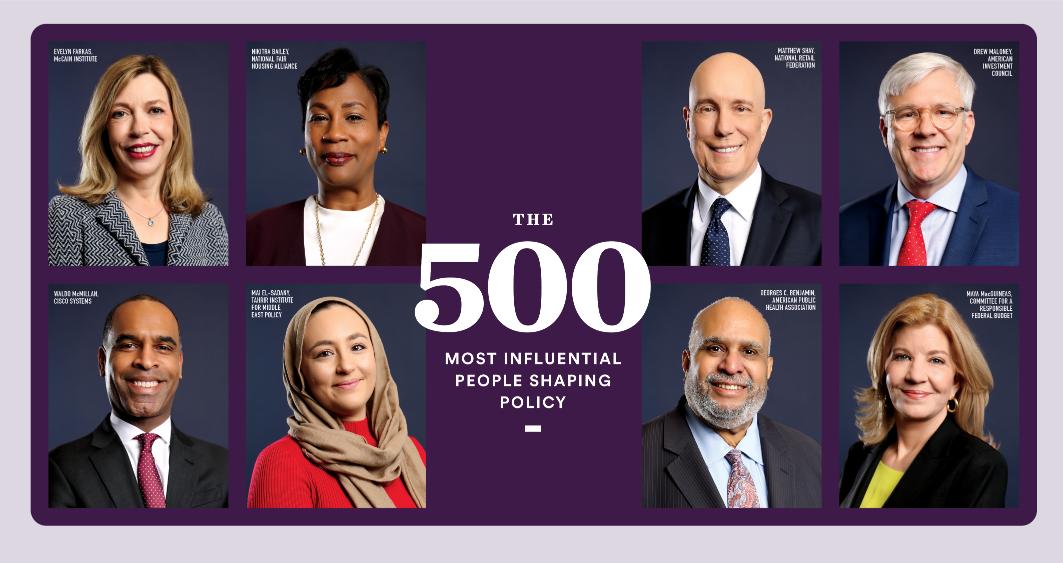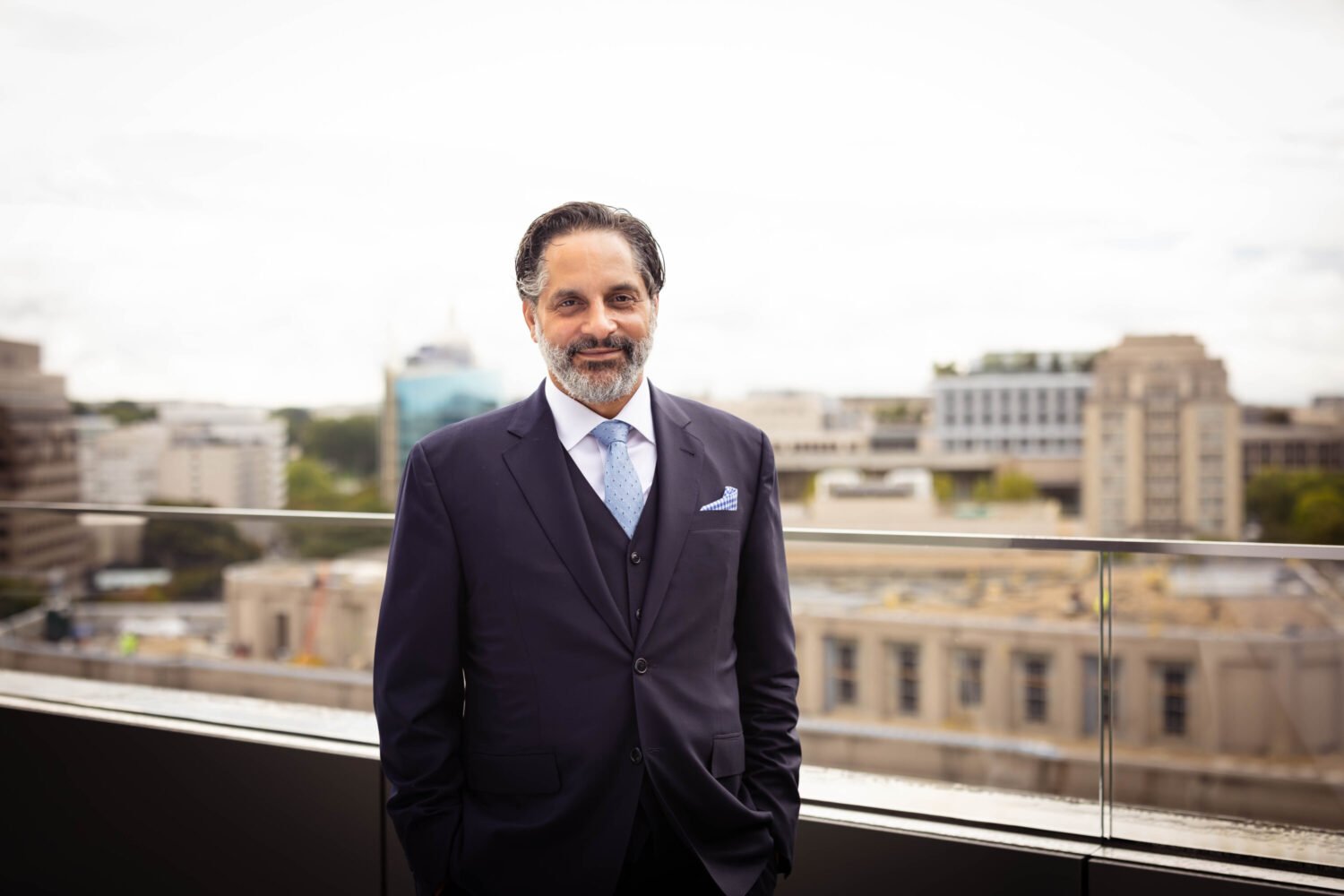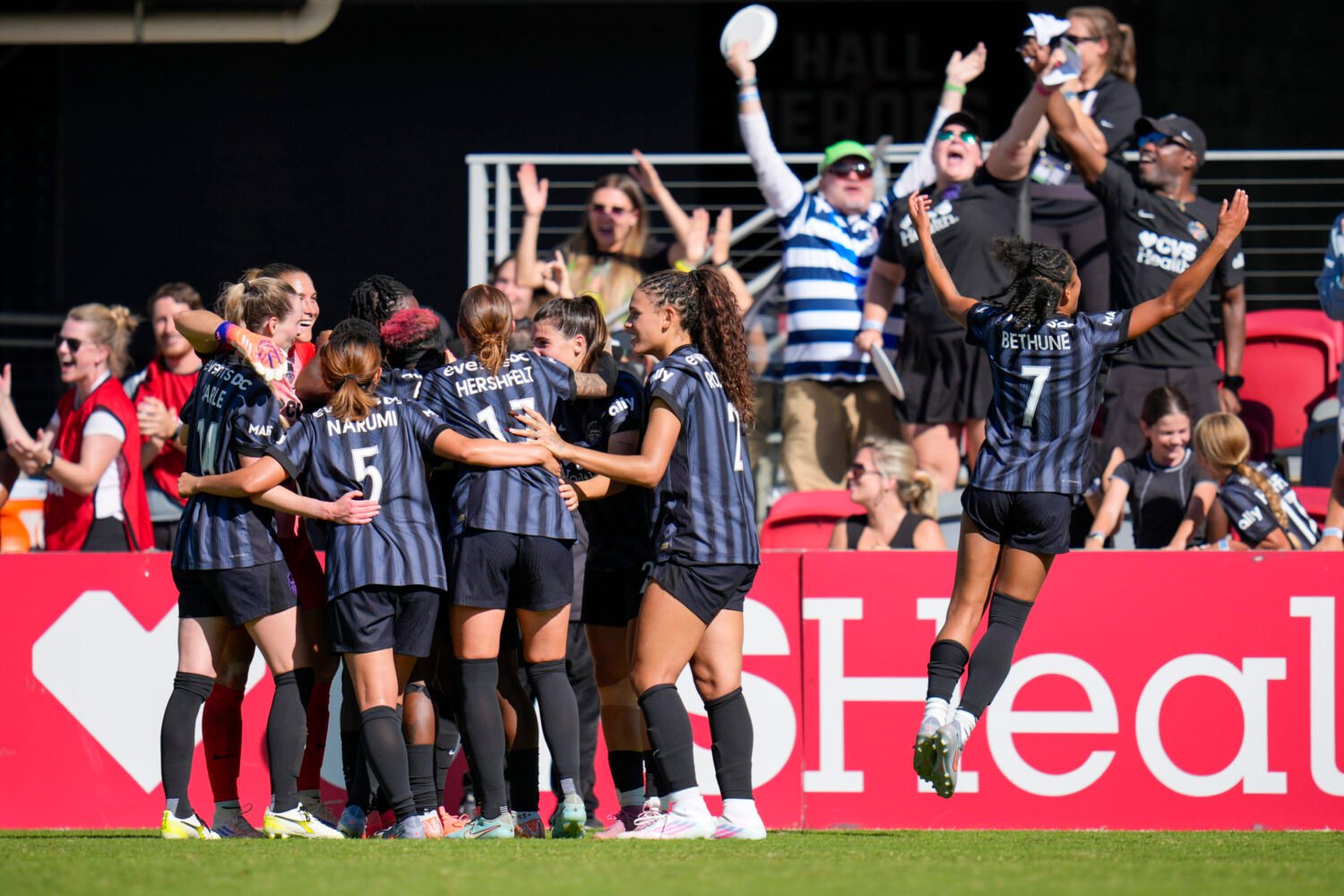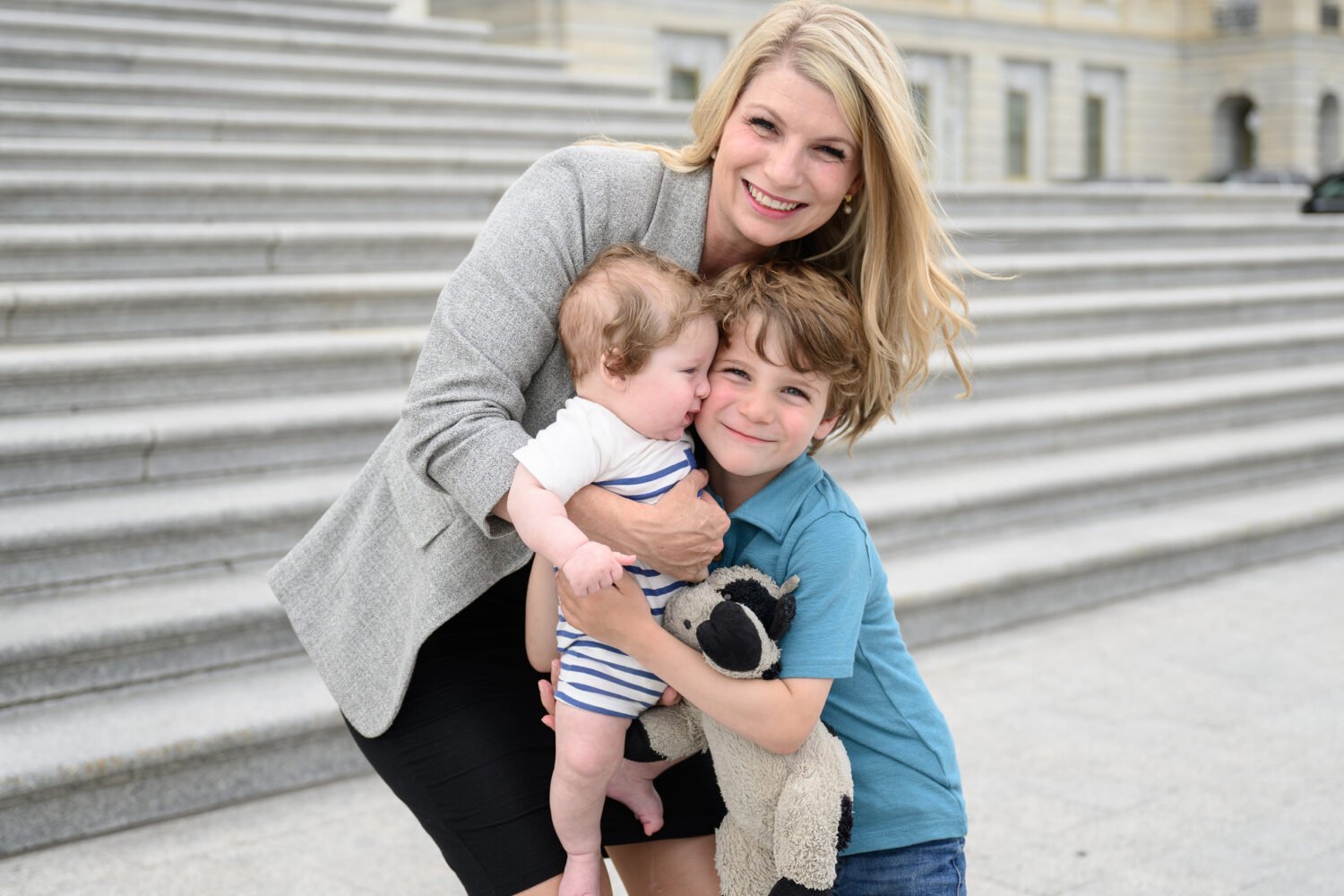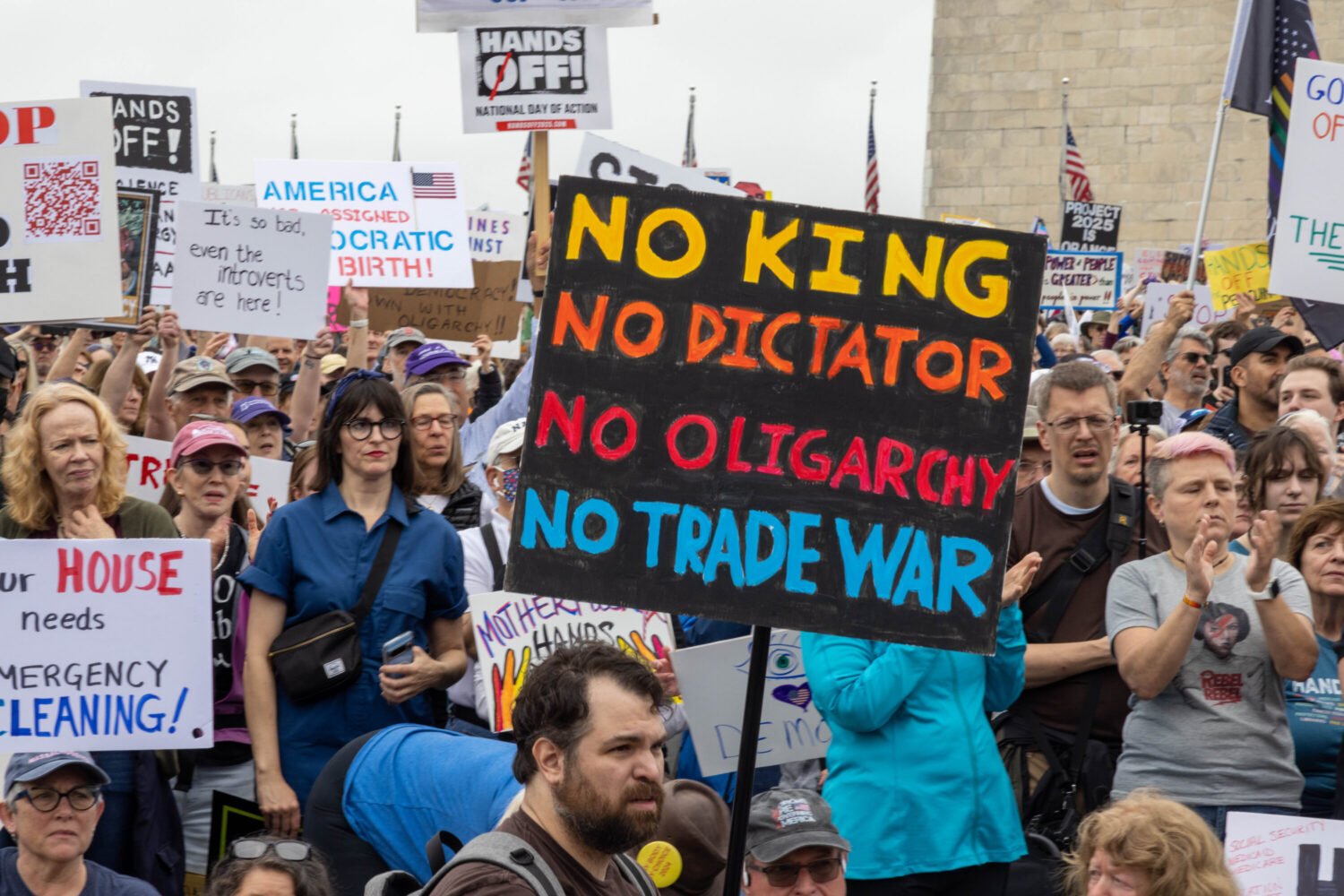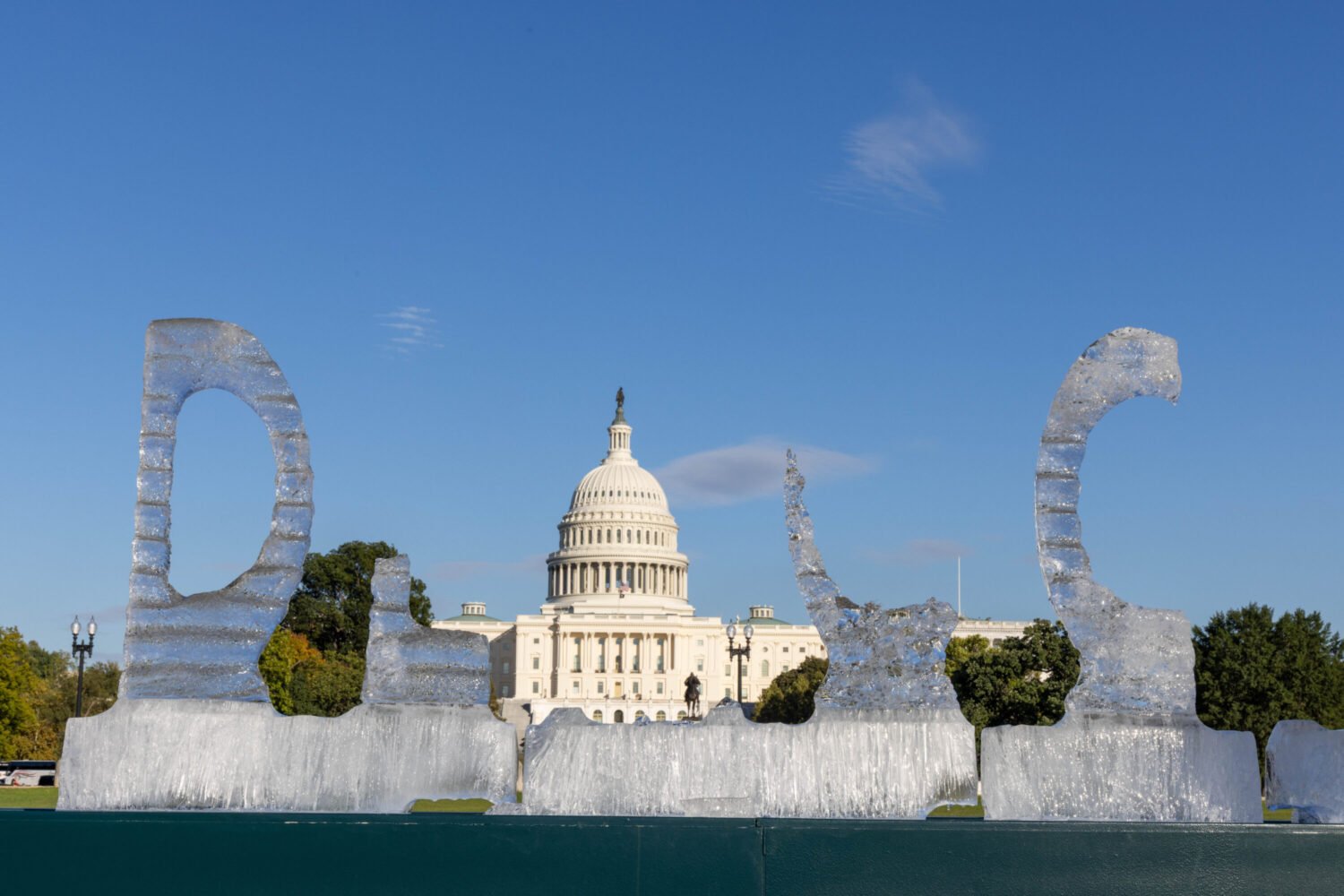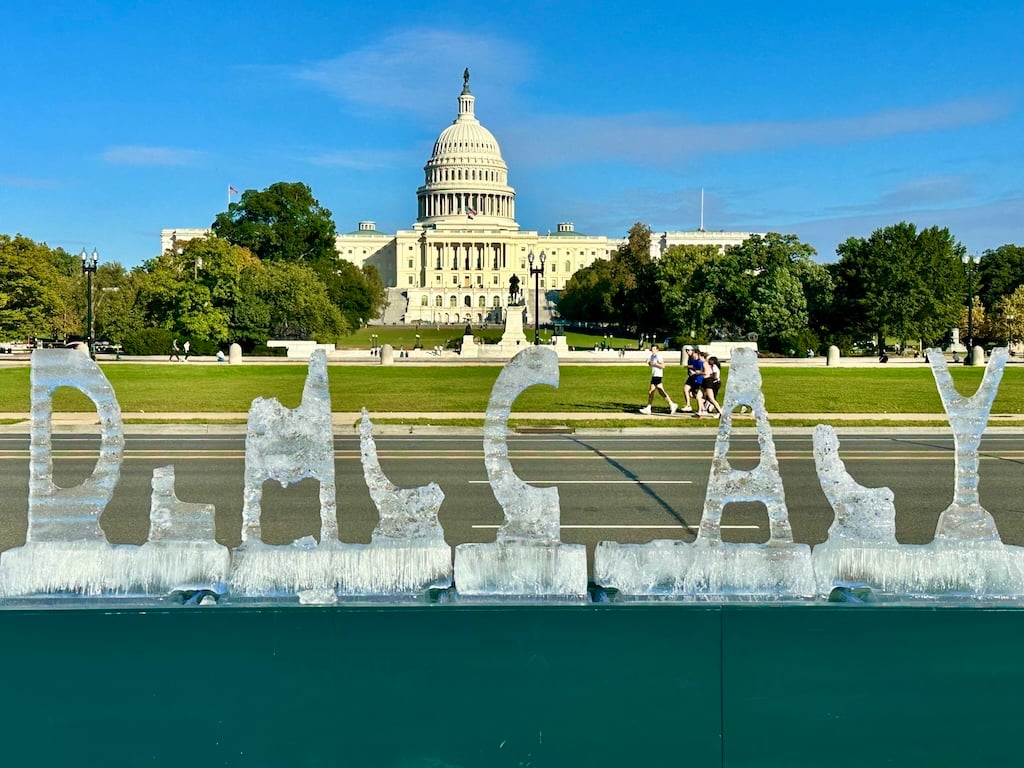From local city halls to the White House, Washington teems with thousands of journalists–probably more than any other city in the world–and the power structures of Washington have always had a love-hate relationship with the press: can't live with it, can't live without it.
As Lyndon B. Johnson once lamented, "If one morning I walked on top of the water across the Potomac River, the headline that afternoon would read PRESIDENT CAN'T SWIM."
Despite the complaints, each morning Washington awakes to another day of news: The city runs on gossip, speculation, and–last but not least–hard facts. Residents across the region scan the day's headlines before leaving their homes, then turn on WTOP or NPR for the commute until they reach the office, where TVs on desks provide running commentary on unfolding events. Throughout the day, BlackBerries hum with breaking-news alerts.
Journalism is so firmly intertwined with government and politics and everything else that it's nearly impossible to separate them. It is as firmly entrenched as any power structure in Washington.
The Washingtonian has looked at the journalism establishment in Washington, including the list of top reporters, every four years since 1973–always the year after a presidential election, when there's traditionally turnover in beats. If you look back to that first year you'll see how much–and how little–has changed.
Since then, cable television arrived, bringing with it 24-hour news networks and hours upon hours of daily talk. The Internet has altered the daily news cycle–turning what was once a morning and afternoon deadline into a minute-by-minute battle for scoops. Journalism at nearly all levels is facing competition and pressures like never before.
Washington reporting has been affected by all this. Television lures many print reporters; some have complicated relationships as part-time television analysts, while others make the jump to TV reporting, sacrificing depth and nuance for fame and money. The Washington Post now has an assistant managing editor for continuous news to coordinate its Web coverage. Budget cuts have gutted the once-powerful bureaus of major regional papers, such as the Baltimore Sun, where Paul West presides over a bureau constantly doing more with less.
Some aspects of the journalism world haven't changed much. The first Washingtonian look at the journalism establishment in 1973 contained a discussion about the need for a federal shield law, which has been hotly debated this year as the New York Times's Judy Miller and Time's Matthew Cooper faced jail time for refusing to divulge their sources. That first roundup also contained gripes about the intransigence of White House press secretary Ron Ziegler–a complaint that rings true to anyone who has watched Scott McClellan's verbal judo with today's press corps.
So in a city beset by reporters, who in journalism holds power and influence? Who are the top unelected movers and shakers who write about the elected movers and shakers?
The list of the area's 50 best and most influential journalists is biased toward reporters who report. As we sorted through candidates, we weeded out the analysts who play pundits on television, the former political aides who create the din of cable television while failing to illuminate the city's inner workings, and those who have been coasting on their reputations.
In addition to the top reporters, we have looks at some rising stars in Washington journalism and at the columnists who may do little reporting but help shape our opinions. By limiting the top-50 list to reporters who work in Washington, we excluded some very good reporters like Anthony Shadid.
The top reporters are but one part of the Washington journalism scene. In the opening picture, we show some of the behind-the-scenes editors and executives who shape the coverage we read and watch–the ones who make up the true journalism establishment.
These are not faces you're likely to know. But their decisions and vision for news coverage has large implications for our country and its politics.
At the Post, Len Downie, the longtime executive editor, John F. Harris, the paper's new national political editor, and Fred Hiatt, the editorial-page editor, influence the national dialogue with their choices about what to cover, what ends up on page A1versus A34, and where the Post should throw its weight.
On I Street, Philip Taubman is the latest in a long line of power brokers to hold the title of New York Times Washington bureau chief. You won't see his byline often, buthis vision is seen daily in the paper's DCcoverage.
Turning to television, the head of the Fox News operation in Washington, Kim Hume, has built a formidable team since she opened the bureau in 1996–and in doing so has built an unrivaled dominance in the ratings. (After initially commiting, Fox News said Hume would not participate in our photo. Spokesperson Paul Schur said the group was not prestigious enough for her to be photographed with.)
Hoping to catch Hume, David Bohrman, a former dot-com executive, is helping CNN/US president Jon Klein reshape the network's coverage, making it snappier and faster.
At NBC and its cable operation, MSNBC, a trio of women–Tammy Haddad, Betsy Fischer, and Elizabeth Wilner–decides the political coverage, who makes it on the marquee Meet the Press, and who gets to play Hardball with Chris Matthews.
In the world of radio news, NPR's Bill Marimow holds lots of influence. The radio network, headquartered on Massachusetts Avenue, is a significant success story in American media. As newspapers slash staff and television networks close bureau after bureau, NPR is growing: adding staff, opening bureaus, and expanding its news coverage. Former Baltimore Sun editor Marimow became the managing editor of NPR News in May 2004.
David G. Bradley, the wealthy businessman and the owner of National Journal, the Hotline, Government Executive magazine, and the Atlantic, is becoming an ever-larger player, especially with his decision to move the Atlantic to Washington from Boston at the end of the year.
At Bradley's Hotline, an elite and expensive daily online news summary of just about every scrap of political news in the country, Chuck Todd's analysis is rarely off the mark. His encyclopedic knowledge of all things political ensures that people seek him for key moments.
Like Todd, Mark Halperin, political director for ABC News and editor of the network's online tip sheet the Note, often seems to know what's happening in back rooms on the Hill, in the White House, and on campaigns before some of the participants. Reporters know that if you follow his lead, you'll rarely be led astray.
Finally, Jack Shafer, Slate's media critic, may not be one of the most widely read journalists, but he's read by all the right people. Thanks to the proliferation of media critcism and news sites online, he has a vast sway in media circles when he chooses to weigh in. Shafer so eschews the trappings of Washington journalism–the TV appearances, the speaking tours, and pat-on-the-back awards–that he refused to take part in the photo that leads this section.
The top-50 list itself encompasses the best and most influential journalists in Washington–which actually turn out to be different measures. While "best" measures talent and ability, "most influential" more than anything measures one's perch. For instance, television is arguably more influential than print. Thus there are television anchors who make our list who wouldn't make a list of the city's "best" reporters. Partly because of the disparate measures of "best" and "most influential," we did not rank this year's list, as we have in some previous years. It's impossible to balance reporting ability versus influence.
In at least one case, influence isn't meant positively. Judith Miller of the New York Times, who spent most of this year at the center of the Valerie Plame investigation, was probably the person who had the most influence in journalism this year; many of her colleagues spent the year trying to nail down her story and its parts. By her November retirement, many respected media observers–including New York University's Jay Rosen–warned that she had done more to damage the reputation of the New York Times than Jayson Blair's reporting scandals of 2003.
In creating this year's list we talked to scores of political observers, pundits, Washington figures, and members of the Fourth Estate. We interviewed reporters and editors about who among their colleagues they seek out, who changes their thinking, and whose lead they follow. We talked to people on the Hill and in and around government about whom they respect and which reporters seem to "get it." This is far from a scientific undertaking. With that said, there was remarkable agreement in the suggestions and lists people submitted.
The last time this list was published, in 2001, it was heavy on Texas reporters as "Dubya" and the Bush administration swept into town. Now, with the 9/11 terrorist attacks and the wars in Iraq and Afghanistan, the list is more heavily geared to foreign policy and national security.
This list also contains fewer women than it has in some years past. Anecdotally at least, after a number of years of increasing gender balance, it seems there's been a subtle shift back toward male reporters at the top echelons of Washington reporting.
The heyday of a generation of groundbreaking women reporters like Helen Thomas and Mary McGrory has passed and a new generation has yet to emerge. Law professor Susan Estrich sparked a debate this year by accusing the Los Angeles Times of "blatant sex discrimination" on its editorial page because of the dearth of female voices. The situation at the Washington Post and the New York Times isn't much better: Anne Applebaum and Maureen Dowd are their lone regular female op-ed writers. The White House press briefing room, the epicenter of Washington journalism, is still heavily male.
There are notable exceptions: CNN now fields an all-female White House team, with Dana Bash, Suzanne Malveaux, and Elaine Quijano. At the Supreme Court, a cabal of talented women has seized control–including Linda Greenhouse of the New York Times, USA Today's Joan Biskupic, and the Chicago Tribune's Jan Crawford Greenburg as well as NPR's Nina Totenberg.
Stars indicate newcomers to the list since 2001.
•Mike Allen (Time)
This recent convert to the newsweekly from the Post's political desk is giving Beltway insiders a reason to resubscribe to Time. His combination of good sources and energy ensures that he can make an impact writing just once a week.
Dan Balz (Washington Post)
With 27 years as a political reporter or editor at the Post, Balz can write and report circles around the younger generation of reporters. When Balz speaks, politicoslisten.
Wolf Blitzer(CNN)
Like him or not, the ubiquitous Wolfman gets the kind of airtime of which other anchors can only dream–17 hours a week split between the frenetic Situation Room and his Sunday talk show, Late Edition.
•Gloria Borger(CBS)
A triple threat, this U.S. News columnist, CBS News correspondent, and PBS commentator is an expert on explaining Washington's machinations.
David Broder(Washington Post)
One of the two entries on The Washingtonian's 1973 "best journalists" list who still makes it today (the other is Bob Novak), Broder's longevity and stature, even in quasi-retirement, ensure that aspiring politicians still need his stamp of approval.
•David Brooks(New York Times)
Although sometimes accused of oversimplifying complex divisions and issues, Brooks's fresh thinking and his perch on the op-ed page ensures a powerful audience.
Ron Brownstein(Los Angeles Times)
Political aides are taught early on that you ignore at your peril phone calls from this respected Washington observer, columnist, and CNN analyst.
•Peter Canellos(Boston Globe)
A powerful and insightful chief for the beleaguered Globe bureau, Canellos manages to be a tough reporter, a visionary editor, and a good manager all at the same time.
•Steve Coll (Washington Post/New Yorker)
The former managing editor of the Post and 2005 Pulitzer Prize winner for his book on terrorism, Coll's jump to the New Yorker ensures that his speciality–thoughtful articles on the Middle East, foreign policy, and terrorism–will continue to shine.
Maureen Dowd(New York Times)
Depending on your viewpoint, MoDo either speaks the spot-on truths–albeit obliquely sometimes–or is a raving lunatic. The two things everyone can agree on? She's powerful, and she's one of the best writers out there.
Howard Fineman (Newsweek)
Writing for the Web has breathed new life into the work of this savvy political commentator.
•Marc Fisher(Washington Post)
Washington's own Mike Royko, he makes the grit of city life come alive in his Metro column.
Ron Fournier(AP)
Writing for the wire requires three attributes: being right, being first, and being fast. Fournier, the Associated Press's lead political writer, has all three in abundance; during election night 2004, he rewrote the main story 67 times. And even as news sources proliferate, nothing has the impact of an AP story.
Thomas Friedman
(New York Times)
The Times's foreign-policy columnist can be largely credited with bringing the ideas and lingo of globalization to the masses.
•Linda Greenhouse
(New York Times)
This Supreme Court observer has mastered covering one of the most secretive institutions in Washington, and her articles blend reporting and analysis to explain where the court is heading.
•David Gregory(NBC)
Embattled White House press secretary Scott McClellan probably has nightmares about this firebrand in the front row of the briefing room. With his booming voice, Gregory lands some of the toughest punches and is the first to call McClellan out for his obfuscations.
•Ken Herman(Cox)
His wry humor and color-laden dispatches from the White House prove that one can have fun even while covering the President.
•Seymour Hersh(New Yorker)
Whoever Hersh's sources are inside the military, he manages to nail stories no one else can, and his reporting on Iraq, terrorism, torture, and Abu Ghraib helped reshape the debate on the home front.
Brit Hume(Fox)
Opinions vary on Fox News, but few question the integrity and hard work of the network's face in Washington–and anchor of cable's number-one weeknight political program, his Special Report.
Michael Isikoff(Newsweek)
His excellent sources can shift the debate and create a story where none existed before. Despite being caught up in a Pentagon kerfuffle this year, he remains arguably the nation's top investigativereporter.
•Al Kamen(Washington Post)
The top reporter on the region's top employer–the federal bureacracy–Kamen and his In the Loop column often seem to know what's going on in government better than the Office of Management and Budget.
•Mark Knoller(CBS)
This bearded, oversize correspondent keeps better records than the White House when it comes to many things presidential and thus is a much bigger "voice" than his CBS Radio perch may imply.
William Kristol
(Weekly Standard)
One of the original neocons, Kristol's thoughtful, reasoned, and honest voice cuts through much of the Washington noise. When his colleagues sought to explain how the Bush administration had lost on Harriet Miers's court nomination, they merely pointed out that Kristol didn't buy in.
Howard Kurtz
(Washington Post)
The nation's most respected (and controversial) voice in media reporting, Kurtz is amazingly prodigious in his output in print, on the Web, and as host of CNN's Reliable Sources.
•Jill Lawrence(USA Today)
One of the best writers at "America's newspaper"; much of the country learns about Washington doings through her writing.
Jim Lehrer(PBS)
The quiet and calm voice of the most thoughtful news show on television, Lehrer has the respect and admiration of his peers.
•Mark Leibovich
(Washington Post)
A shining light in an otherwise anemic Style section, the Post's attitude-laden Leibovich can wield enormous sway–just ask Teresa Heinz Kerry, who never really overcame his 2002 profile of her.
David Martin(CBS)
A 12-year veteran of the national-security beat, Martin was reporting on the subject long before it became cool. He's proved time and again during the war in Iraq that experience and in-depth knowledge matter.
Chris Matthews(MSNBC)
Omnipresent on TV, this smart and energetic pundit doesn't just play Hardball. Along with his wife, Kathleen, Matthews is also omnipresent on the charity circuit, lending his stature to good causes.
Tony Mauro (Legal Times)
In a city as filled with lawyers as Washington, Legal Times is a must-read–and Mauro is number one on its pages. He predicted John Roberts would be President Bush's choice for the Supreme Court six months before anyone else.
Doyle McManus
(Los Angeles Times)
A force within the newly-combined-but-certainly-not-united Tribune Company superbureau, McManus is one of a disappearing breed in Washington: the powerful bureau chief who is also a powerful writer.
•Dana Milbank
(Washington Post)
If White House reporting can ever be described as "edgy," Milbank's sketches are just that. He excels at taking readers inside the Big Decisions that shape history.
•Judy Miller
(New York Times)
Objectively it's hard to say that any reporter in Washington has had more influence on the media this year than the New York Times cause célèbre who spent nearly three months in jail yet managed to emerge more a pariah than ever.
•Terry Moran
(ABC)
A dogged reporter, this new co-anchor of Nightline is a familiar face–and pain–to many a White House official.
•Adam Nagourney
(New York Times)
Getting ahead in Washington has never been easy, but just try doing it without first getting past Nagourney, the top political writer at the nation's top newspaper. When he goes above the fold on page A1, people pay attention.
Robert Novak
(Chicago Sun-Times)
One of the last two top reporters from our first list in 1973 still around (along with Broder), Novak–known in certain circles as the Prince of Darkness–still manages to get stories about the GOP no one else can. And don't forget that much of Washington spent this year in fits over his 2003 column outing Valerie Plame.
•Dana Priest
(Washington Post)
This top military and intelligence watcher has proven herself in a male-dominated niche by repeatedly putting her own boots on the ground in far-flung places to watch the American military empire unfold first-hand.
•Todd S. Purdum
(New York Times)
Purdum's well-written explanations and unique looks at Washington life still shine even in an editor's paper like the Times.
Cokie Roberts
(ABC/NPR)
Raised in Washington society and Capitol Hill life, Roberts is as veteran as they come–and a voice of reason and moderation in a city with too little of either.
•Eugene Robinson
(Washington Post)
In both intelligence and style, he is one of the brightest writers on the Post's op-ed page. His loss a year ago to Phil Bennett as managing editor has been the readers' gain.
Tim Russert
(NBC)
Even while many insiders believe that Russert has increasingly become a caricature of himself, the Sunday-morning "Russert primary" is a must-do for anyone who's anyone in Washington. If you want to be sure you're heard, you still have to Meet the Press.
David E. Sanger
(New York Times)
One of the nation's most respected voices on foreign affairs; it's no coincidence that he's twice worked on reporting teams that have won the Pulitzer Prize.
•Bob Schieffer(CBS)
At 68, Schieffer works harder than most journalists half his age–anchoring the CBS Evening News and doing Face the Nation every Sunday. In doing so, he's helping to restore some luster to and boost morale at a network that has spent too long under seige.
Tom Shales(Washington Post)
The Post probably doesn't employ a sharper pen than the one belonging to its television critic–a man with the freedom to write on a presidential speech one day and the WB the next. Don't think, though, that the WB network executives read him any less carefully than the administration does.
•Tom Sherwood
(WRC-TV)
A local reporter with solid sources and unique insight into the sausage-making that is the District government.
•George Stephanopoulos(ABC)
Though this former Clinton aide's selection to head the storied This Week was originally considered a journalistic travesty, he's building a Sunday show that's fresh and offers a voice distinct from the other talk fests. Plus, he knows what he's talking about.
•John Walcott
(Knight Ridder)
The bureau chief of the far-reaching Knight Ridder chain, Walcott, along with his team of correspondents, is managing to turn out impressive work even as his corporate bosses slash costs.
•Mike Wilbon
(Washington Post)
This Post sports columnist and ESPN Pardon the Interruption cohost brings a well-trained and sardonic eye–as well as a hearty laugh–to his coverage.
•David Willman
(Los Angeles Times)
While his reportage is controversial, Willman's investigative work, particularly around NIH, has launched congressional and federal investigations.
Bob Woodward
(Washington Post)
Thirty-plus years after he first showed up on The Washingtonian's 1973 list of great investigative journalists, the dean of the field is still going strong. With each of his projects destined for a book and front-page treatment, you need only to invoke his last name to strike fear into the hearts of government officials.
Great Explainers & Thinkers
Washington is a complicated city, and gathering the news sometimesisn't enough. Separate from the city's top reporters, Washington has a whole class of talented explainers–the analysts who put things in context, tease out trends, and help everything fall into place. This list concentrates on journalistic columnists–not the political punditocracy of "former" something-or-others who fill the cable news talk shows and pen op-eds with reckless abandon.
Politically, columnist George Will, the Wall Street Journal's Alan Murray, PBS's Gwen Ifill, and C-Span's Brian Lamb bring thoughtful and levelheaded analysis to the table, helping viewers and readers make sense of Washington's ups and down. Charles Krauthammer's blunt style ensures that one never misses his point–and it's usually a good one.
Bringing insight to the economic front, Steve Pearlstein of the Washington Post and Robert Samuelson of Newsweek make their readers think about money and markets in new ways.
National Journal, the city's wonky weekly must-read, is packed with people who pull together the threads of the news to paint bigger pictures and explain what it means: Stuart Taylor Jr. is nearly unrivaled on the political and legal front; Bill Powers is an expert media thinker; and Charlie Cook knows politics like the back of his hand.
Then there are the explainers who elevate writing to an art: Peter Beinart of the New Republic, Christopher Hitchens of Vanity Fair, and Anne Applebaum of the Washington Post. Sadly, Washington lost one of its best writers prematurely this year: Marjorie Williams, whose posthumous essay on cancer in October's Vanity Fair was one of the best on the subject ever written, died in January of liver cancer.
People to Watch
Here are journalism's rising stars, those likely to have a major impact in coming years.
The first three are moving to take advantage of the ways the Internet is changing the news business. Rajiv Chandrasekaran is the Washington Post's new assistant managing editor for continuous news, the paper's title for its Internet news coordinator. With the Post's flagship Web site increasingly a focus of its approach to news gathering, Chandrasekaran might change the way readers interact with the Post. National Journal's daily online Hotline has long been the definitive guide to what is going on in politics–but pricey subscriptions have limited how broadly it gets disseminated. Now Marc Ambinder, who used to work at ABC News's daily political tip sheet, the Note, has been brought in to work on ways to open the Hotline's offering to a broader audience. Among the tech gurus, John Aravosis, a Washington-area lefty political blogger, is one of the nation's first bloggers to earn a living that way. If the hype around blogging is to be believed, the future of journalism in America might look a lot like Aravosis, who broke February's scandal involving disgraced White House reporter Jeff Gannon.
With a generation of television legends retiring–the last year has seen the disappearance of all three network evening news anchors as well as the retirement of CNN's Judy Woodruff–the medium has a need for new blood. ABC's Jessica Yellin is proving downright fiery as the new kid in the front row of the White House briefing room, peppering press secretary Scott McClellan with unrelenting questions. Her colleague Jake Tapper, the network's man about town, is penning a daily blog (blogs.abcnews.com/downanddirty) about his reporting exploits as well as offering his own news-related haikus. CNN has started turning to Ed Henry, who made the big jump from Roll Call to TV last year, for tough assignments: When the network decided to grill its analyst Bob Novak about the Valerie Plame investigation, it put Henry in the anchor chair. Ted Koppel–long a familiar face on Nightline–is embarking on a new career in long-form documentaries. No one knows what he'll be doing, but don't think you've heard the last of him.
Two of the reporters, Maureen Groppe of Gannett News Service and Jeff Zeleny of the Chicago Tribune, are likely to have an impact in future presidential elections. If Senator Evan Bayh runs for president in 2008, Groppe, as Bayh's "hometown" reporter for the Indianapolis Star, is going to have a lot to say about him. The Chicago Tribune's rising star, Zeleny, is hard at work chronicling the rise of Democratic wunderkind Barack Obama. If Obama runs for higher office, no one in the press corps will know him better.
Doubt that local reporters can have an impact nationally? Remember that 16 years ago Ron Fournier, the Associated Press's chief political writer and regarded as one of the best in the business, was an Arkansas AP reporter covering a governor named BillClinton.
In the Post's newsroom, Jonathan Weisman, new to the paper's national desk, is doing standout work. Two magazine writers have great potential: Ryan Lizza of the New Republic and Jeffrey Goldberg, the new author of New Yorker's storied Letter From Washington column.
Editor at large Garrett M. Graff profiled Washington Post media writer Howard Kurtz in the July issue. He also writes FishbowlDC (www.fishbowldc.com), a blog that covers the media and journalism in Washington.




